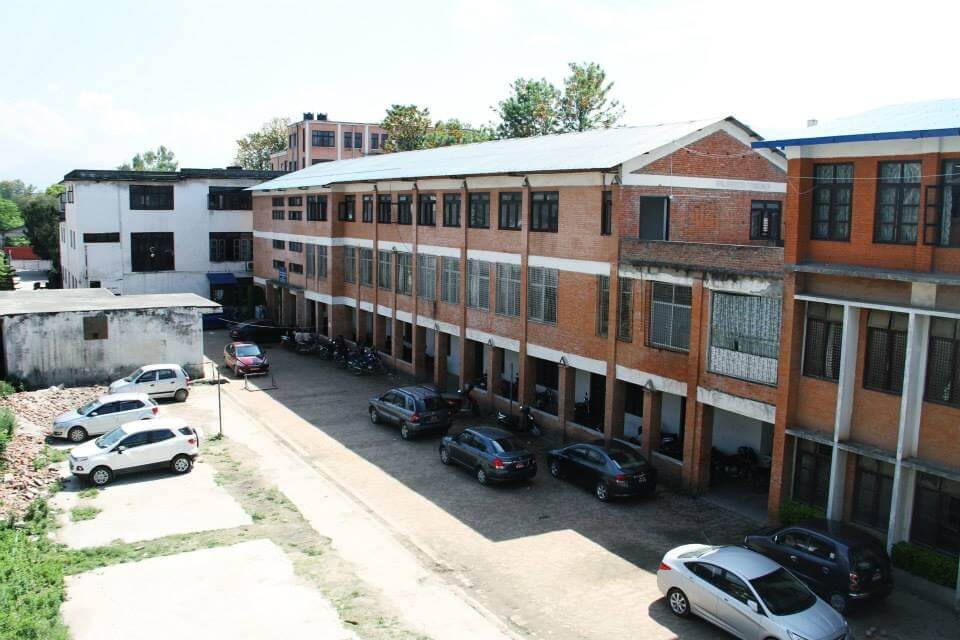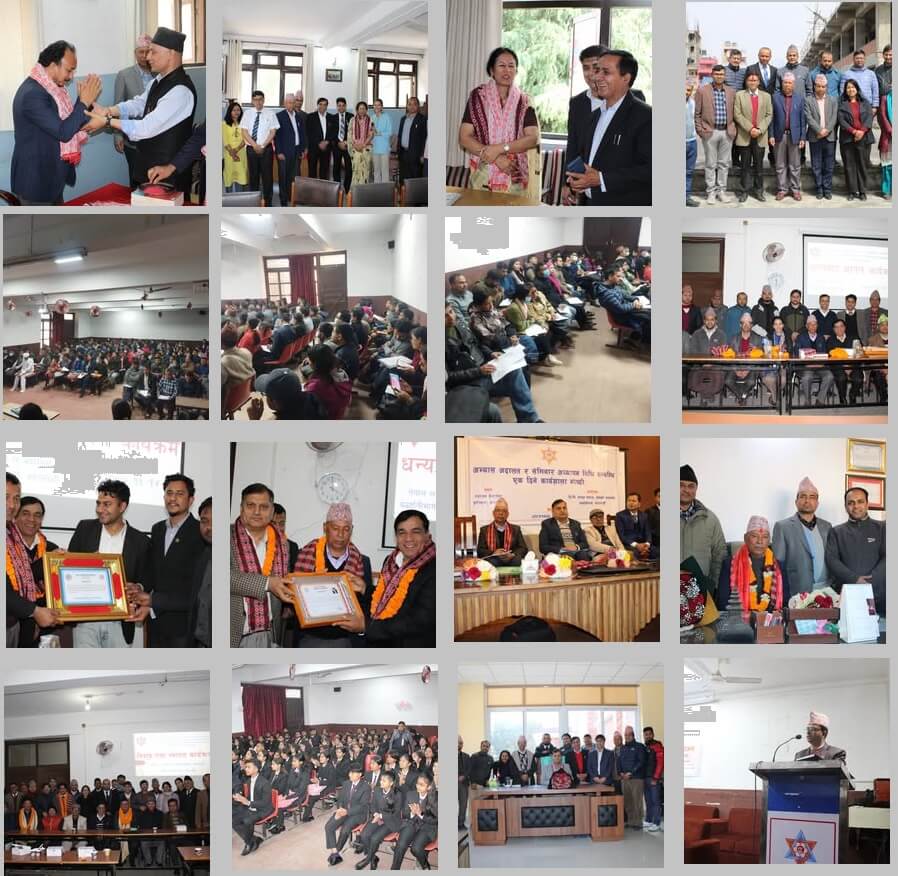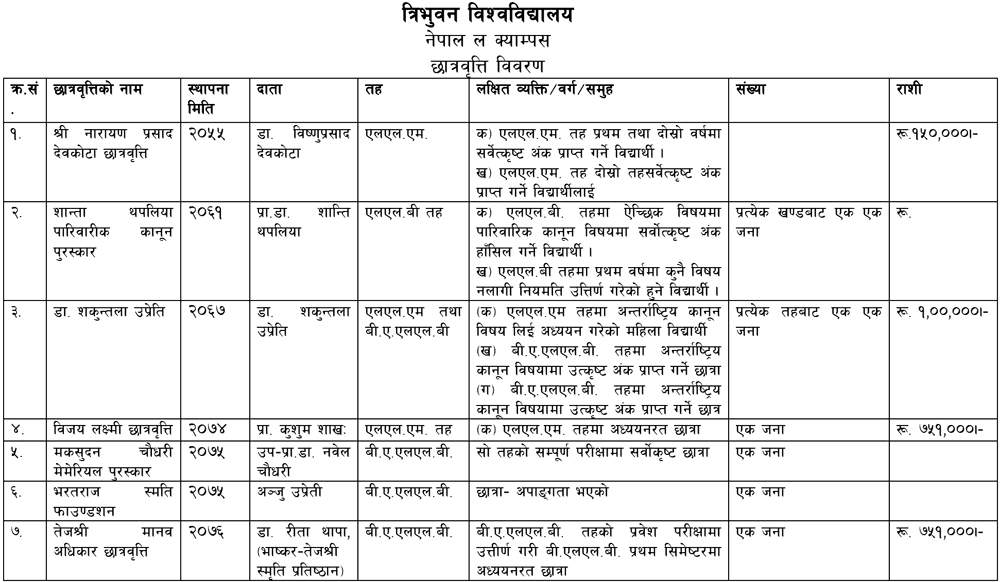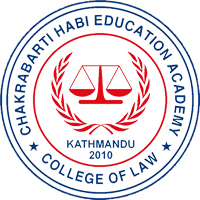Overview
Nepal Law Campus (NLC) is Nepal's oldest and leading institution for legal education. It began operations in 1954 and is in the heart of the capital city. NLC has significantly shaped the country's legal education system, witnessing challenges and achievements throughout its journey.
As a constituent campus of Tribhuvan University and the pioneer in legal education, Nepal Law Campus takes pride in its substantial contribution to the field. NLC has produced highly competent leaders for the judiciary and other legal mechanisms in Nepal and abroad.
Nepal Law Campus has designed a range of programs to cater to the diverse needs of aspiring law students. These include the three-year Bachelor of Laws (LL.B.) program, the five-year Bachelor of Arts Bachelor of Laws (B.A.LL.B.) program, the two-year Master of Laws (LL.M.) program, and the three-year Master of Laws (LL.M.) program. Through these comprehensive programs, NLC aims to provide students with a strong foundation and in-depth knowledge of legal principles.
Nepal Law Campus boasts a team of highly qualified and dedicated faculty members comprising professors, readers, and lecturers. These experienced professionals bring their expertise and passion to the classroom, ensuring students receive quality education and guidance throughout their academic journey.
Over the years, Nepal Law Campus has produced numerous law graduates who have gone on to hold prestigious positions in governmental and non-governmental organizations within Nepal and abroad. Graduates from NLC have secured top positions in the legal and administrative sectors, such as the Attorney General of Nepal, Chief Justice of Nepal, Justices of the Supreme Court, judges, and judicial officers in Nepal. Additionally, many have become acclaimed academicians in renowned universities worldwide.

Features and Faciliites:
Research Journals:
Nepal Law Campus takes pride in publishing two academic and research-based journals: the Nepal Law Review (NLR) and the Nepal Journal of Legal Studies (NJLS).
Nepal Law Review (NLR):
-
Established in 1977, NLR is an annual publication in English.
-
It welcomes submissions of original research articles on legal and constitutional issues, legal developments, commentaries, analyses, book reviews, case comments, and comprehensive overviews of domestic and international law.
-
Articles must be research-oriented, unpublished elsewhere, and submitted in MS Word format on a compact disc (CD), accompanied by a hard copy of the manuscript.
-
The editorial board reserves the right to make necessary modifications, changes, or revisions to accepted manuscripts. They also have the authority to reject, withhold, or postpone publication.
-
Authors are required to adhere to standard citation rules when submitting their work.
Nepal Journal of Legal Studies (NJLS):
-
NJLS is an annual peer-reviewed journal managed by the B.A. LL.B. Program at Nepal Law Campus.
-
Since its inception in 2016, NJLS has fostered an academic culture in legal studies and contributed to legal scholarship in Nepal.
-
The journal accepts original manuscripts in articles, essays, and comments throughout the year.
-
It follows a double-blind peer-review format to ensure the integrity and quality of published works.
-
While the primary focus is on legal issues in Nepal, interdisciplinary contributions to the global legal field are also accepted.
Library:
Nepal Law Campus has a well-furnished library with many resources for legal studies. These include textbooks, reference books, law journals, gazettes, and the Nepal Law Reports (NLR). Students also have access to an e-library.
Furthermore, students can access resources at other libraries, such as the Central Library TU, Kirtipur, Central Law Library Jamal, Supreme Court Library, Nepal Bar Association Library, Library of the Office of the Attorney General of Nepal, Nepal Bar Council Library, American Information Center, and SAARC Library. Additionally, professors, researchers, and students have free access to the Wi-Fi Zone within the Nepal Law Campus.
Computer Lab:
Nepal Law Campus features a well-equipped computer lab with internet access. Students can use this space for various academic and research activities.
Sports:
To promote a healthy and balanced lifestyle, Nepal Law Campus offers its students both indoor and outdoor sports facilities. Engaging in sports activities helps students rejuvenate their minds and maintain physical well-being.
Medical Facility:
NLC understands the importance of student health and has a dispensary that provides primary healthcare services. Students can also receive medical assistance on campus if necessary.

Classrooms, Moot Court, and Seminar Hall:
Nepal Law Campus provides well-furnished and equipped classrooms with multimedia projectors, ensuring a conducive learning environment. Additionally, there is a separate Moot Courtroom and a seminar hall where students can enhance their practical skills and engage in interactive sessions.
Nepal Law Campus aims to provide comprehensive facilities and resources to support its students' academic and personal development, creating a nurturing environment for aspiring legal professionals.
Scholarship Details of Nepal Law Campus:

1. Shri Narayan Prasad Devkota Scholarship
-
Date of Establishment: 2055
-
Donor: Dr. Bishnu Prasad Devkota
-
Layer: LL.M.
-
Target Person/Class/Group:
a) LL.M. The student who obtained the best marks in the first and second years.
b) LL.M. To the student who obtained the best marks in the second level.
-
Amount: Rs. 150,000/-
2. Thapaliya Shanta Family Law Award
-
Date of Establishment: 2061
-
Donor: Prof. Dr. Shanti Thapaliya
-
Layer: LL.B Teh
-
Target Person/Class/Group:
a) LL.B. The student who scored the best marks in Family Law in the optional subject at the level.
b) Students who have passed regularly without any subject in the first year of LL.B level.
-
Number: One person from each section
3. Dr. Shakuntala Upreti Scholarship
-
Date of Establishment: 2057
-
Donor: Dr. Shakuntala Upreti
-
Layer: LL.M and B.A.LL.B
-
Target Person/Class/Group:
a) Women students studying international law at the LL.M level.
b) B.A.LL.B. The girl student who obtained the best marks in international law at the level.
c) B.A.LL.B. A student who has obtained excellent marks in international law at the level.
-
Number: One from each level
-
Amount: Rs. 1,00,000/-
4. Vijay Lakshmi Scholarship
-
Date of Establishment: 2074
-
Donor: Pvt. Kushum Branch
-
Layer: LL.M. folding
-
Target Person/Class/Group: LL.M. A female student studying at the level.
-
Number: One person
-
Amount: Rs. 751,000/-
5. Maksudan Chowdhury Memorial Award
-
Date of Establishment: 2054
-
Donor: Vice Principal Dr. Naveel Chowdhury
-
Layer: B.A.LL.B
-
Target Person/Class/Group: The best student in all the exams of that level.
-
Number: One person
5. Bharatraj Smti Foundation Scholarship
-
Date of Establishment: 2054
-
Donor: Anju Upreti
-
Layer: B.A.LL.B
-
Target Person/Class/Group: A female student with a disability.
-
Number: One person
6. Tejashree Human Rights Scholarship
-
Date of Establishment: 2076
-
Donor: Dr. Rita Thapa (Bhaskar-Tejshree Smriti Pratisthan)
-
Layer: B.A.LL.B
-
Target Person/Class/Group:
-
B.A.LL.B. Students study in the first semester after passing the entrance examination for B.L.L.B.
-
-
Number: One person
-
Amount: Rs. 751,000/-
Admission Guidelines for Nepal Law Campus
1. Bachelor of Arts Bachelor of Laws (B.A.LL.B.)
BALLB program combines the study of Arts and Law, providing a comprehensive understanding of legal principles and their societal implications. It equips students with a brothel edge and skills for a successful legal career.
-
Duration: 5 years
-
Total Seats: 160
-
Eligibility: Applicants must have completed 10+2 or an equivalent examination with at least a 'D+' grade in all subjects.
-
Application Process: Interested candidates should apply when the Faculty of Law, Tribhuvan University, announces admission for the B.A.LL.B. program.
-
Entrance Exam: All applicants, except foreigners, must appear for an entrance exam conducted by the Office of the Dean, Faculty of Law, TU. The entrance exam consists of subjective and objective tests.
-
Language of Exam: The entrance exam can be either English or Nepali.
2. Bachelor of Laws (LL.B.)
The LL.B. program focuses on providing students with a solid foundation in law. It offers an in-depth study of legal concepts, principles, and practices, preparing students for diverse career opportunities in the legal profession.
-
Duration: 3 years
-
Total Seats: 600
-
Eligibility: Candidates must have completed a bachelor's degree from a recognized institution to be eligible for the three-year LL.B. program.
-
Application Process: Applicants can apply for the LL.B. program during the general admission period for master's degree programs at Tribhuvan University.
3. Master of Laws (LL.M.)
The LL.M. program provides advanced legal education to graduates who wish to specialize in a particular area of law. It offers a range of specialization options, enabling students to develop expertise in their chosen field and pursue career opportunities at the highest levels of legal practice or academia.
-
Duration: 2 years
-
Total Seats: 85
-
Eligibility: Students seeking admission to the two-year LL.M. program can apply during the admission period for other master's degree programs at Tribhuvan University.
-
Entrance Exam: Applicants, excluding foreigners, must attend an entrance exam. The exam is conducted in either English or Nepali and follows the syllabus of the Bachelor of Laws (LL.B.) Jurisprudence.
4. Three Years Master of Laws (LL.M.)
The three-year LL.M. program offers specialized studies in various legal areas. It allows students to deepen their understanding of specific legal disciplines, enhance their research skills, and broaden their career prospects in academia, legal practice, or public service.
-
Duration: 3 years
-
Total Seats: 35
- Admission Process: The admission process for the three-year LL.M. program is similar to that of the two-year LL.M. program.
Nepal Law Campus, with its wide range of programs and esteemed faculty, aims to provide students with high-quality legal education and nurture their intellectual growth, critical thinking, and professional skills.
Contact Nepal Law Campus's administrative office for detailed information on the course, admissions, location, fees, scholarships, facilities, counseling or eligibility.












